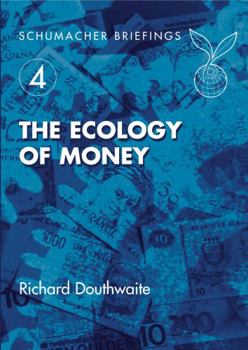The Ecology of Money
In this Schumacher Briefing, Richard Douthwaite argues that just as different insects and animals have different effects on human society and the natural world, money has different effects according... This description may be from another edition of this product.
Format:Paperback
Language:English
ISBN:1870098811
ISBN13:9781870098816
Release Date:February 2000
Publisher:Green Books
Length:78 Pages
Weight:0.30 lbs.
Dimensions:0.4" x 5.8" x 8.2"
Customer Reviews
2 ratings
Still figuring it out...
Published by Thriftbooks.com User , 16 years ago
... but it was very informative. Don't quite understand the differences between types of money- but then I'm a bit slow on some corners of economics- fortunately the author makes some understandable points, and gives other sources for your further education. Despite my grumbling, this is a vry good way to start on understanding this confusing set of issues.
A Monetary System for the Age of Global Warming
Published by Thriftbooks.com User , 25 years ago
If you are one of those benighted souls, as I was, who thinks of money as just a convenience which saves us from having to haul bushels of wheat and live pigs along with us when we go shopping, read this book. In less than 80 pages, Richard Douthhwaite delves into the history and functioning of monetary systems, amply demonstrating that money is much more than just a convenient means of exchange. Shockingly, he persuasively shows that what most of us think of as money is in reality little more than smoke and mirrors "coined" by commercial banks in their quest for profits and that a monetary system based on such interest-bearing currency not only promotes but is dependent on continuous economic growth. This is the crux of the issue for Douthwaite, an environmentalist/economist who has debunked the supposedly positive benefits of growth in his earlier work, "The Growth Illusion". Douthwaite proposes a non-growth dependent, four-tiered monetary system, in part based on "energy-backed currency units", which would encourage efficient usage, if not actual replacement, of carbon-based fuels. Many criticisms might be levelled at Douthwaite. I have a few. For instance, it seems ironic, to say the least, to base a monetary system that is meant to foster "sustainability" on a non-renewable, and therefore dwindling, resource. Also, his suggestion that fuel emission rights be apportioned amongst the nations of the world on a per capita basis represents such a massive transfer of wealth to heavily populated, poor countries, who would no doubt immediately sell their freely obtained rights to the energy-addicted rich countries, smacks of blue sky daydreaming (just looks at how far another form of wealth transference - debt relief for countries too poor to repay their debts in any case - has gotten!). As an advocate of zero growth, both demographic and economic, I was disappointed that Douthwaite frames his proposals only within the context of a global free market amongst competing nation-states. It would be interesting to see what sort of monetary system he would propose on the presumption of a planned global economy, based on mutual survival, in which zero growth is considered not only desirable but mandatory. This, too, is blue sky daydreaming, I admit, but what truly effective remedies in this increasingly precarious world of ours aren't? But whatever its shortcomings, "The Ecology of Money" presents an illuminating look into our current monetary system and some provocative ideas for reforming it. It's a must read for anyone concerned about where the world, and its confused, nearsighted human species, are headed.






